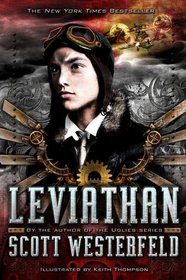Helpful Score: 2
Reviewed by Karin Librarian for TeensReadToo.com
LEVIATHAN is a novel of alternate history. More specifically, it can be classified as steampunk, which depending on what definition you read, is an extension of science fiction and fantasy. Westerfeld decides to reinvent the era of World War I in his latest novel. While he maintains some of the actual events of the war, he creates and alters many.
The story follows the lives of Deryn and Alek. Deryn is a young woman desperate to join the Air Men of the Darwinists Army (British Empire/France). With the help of her brother, she disguises herself as a boy and joins the fight. She has excellent Air Sense, which is a must for the Darwinists, since their main type of weaponry are flying airships made of living animals, with each animal in the ecosystem playing its part. The Leviathan is an airship made up of a countless number of animals - from the smallest microscopic animal to a giant whale that contains everything.
Alek's parents, the Archduke Franz Ferdinand and his wife, have been assassinated, leaving Alek on the run for his life. The Austro-Hungarian Empire/Germany wants him dead in order to ensure the end of the bloodline to the throne. Alek's people are referred to as the Clankers because of the loud noises that come from their form of weaponry - swords, cannons, aeroplanes, and, most exciting, walkers. Picture a huge tank with legs instead of treads.
Both Deryn and Alek are dedicated to their causes, and when they are thrust into the same fight and forced to work together, both must take a look at the world around them and see things from the other's perspective.
The ending really leaves the reader hanging, and not necessarily in a good way. I felt like it cut off right when we needed some important information, but I guess Westerfeld is leaving that for the sequel.
The book contains several beautiful black-and-white illustrations by Keith Thompson. I really enjoyed coming across those throughout the story.
Even though LEVIATHAN took me a while to get through, I still enjoyed it and look forward to the sequel.
LEVIATHAN is a novel of alternate history. More specifically, it can be classified as steampunk, which depending on what definition you read, is an extension of science fiction and fantasy. Westerfeld decides to reinvent the era of World War I in his latest novel. While he maintains some of the actual events of the war, he creates and alters many.
The story follows the lives of Deryn and Alek. Deryn is a young woman desperate to join the Air Men of the Darwinists Army (British Empire/France). With the help of her brother, she disguises herself as a boy and joins the fight. She has excellent Air Sense, which is a must for the Darwinists, since their main type of weaponry are flying airships made of living animals, with each animal in the ecosystem playing its part. The Leviathan is an airship made up of a countless number of animals - from the smallest microscopic animal to a giant whale that contains everything.
Alek's parents, the Archduke Franz Ferdinand and his wife, have been assassinated, leaving Alek on the run for his life. The Austro-Hungarian Empire/Germany wants him dead in order to ensure the end of the bloodline to the throne. Alek's people are referred to as the Clankers because of the loud noises that come from their form of weaponry - swords, cannons, aeroplanes, and, most exciting, walkers. Picture a huge tank with legs instead of treads.
Both Deryn and Alek are dedicated to their causes, and when they are thrust into the same fight and forced to work together, both must take a look at the world around them and see things from the other's perspective.
The ending really leaves the reader hanging, and not necessarily in a good way. I felt like it cut off right when we needed some important information, but I guess Westerfeld is leaving that for the sequel.
The book contains several beautiful black-and-white illustrations by Keith Thompson. I really enjoyed coming across those throughout the story.
Even though LEVIATHAN took me a while to get through, I still enjoyed it and look forward to the sequel.
Helpful Score: 2
My overall opinion on this book is that the intriguing Darwinist faction is interesting enough to more than compensate for the typical YA (young adult) plot dvice of the teenage protagonist who just might save the day.
I also enjoyed how many historically accurate facts were used verbatim or as a direct inspiration for events in the book. The afterword was fascinating as the author described the way in which he integrated history into his writing.
I will definitely put aside my dislike of typical YA writing to read the rest of the trilogy.
I also enjoyed how many historically accurate facts were used verbatim or as a direct inspiration for events in the book. The afterword was fascinating as the author described the way in which he integrated history into his writing.
I will definitely put aside my dislike of typical YA writing to read the rest of the trilogy.




![header=[] body=[Get a free book credit right now by joining the club and listing 5 books you have and are willing to share with other members!] Help icon](/images/question.gif?v=29befa08)
